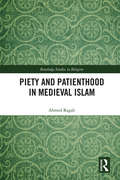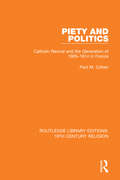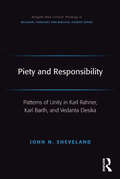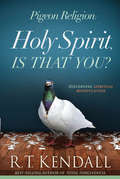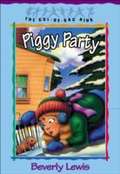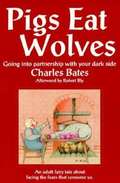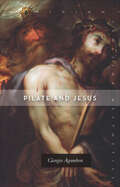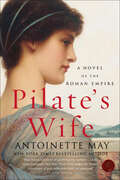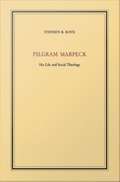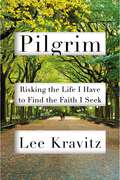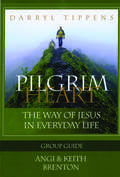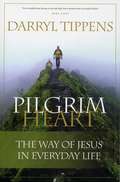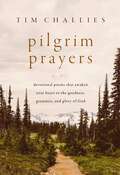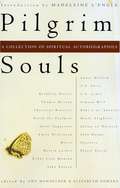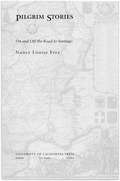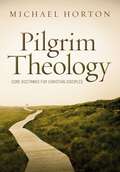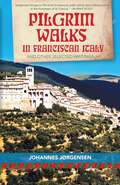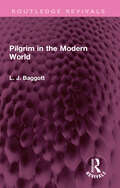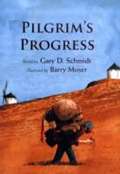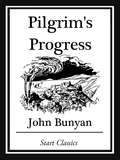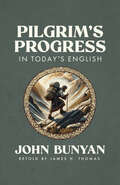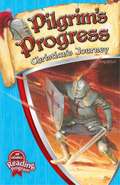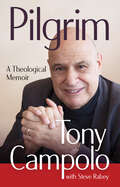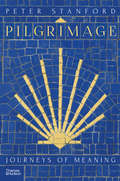- Table View
- List View
Piety and Patienthood in Medieval Islam (Routledge Studies in Religion)
by Ahmed RagabHow did pious medieval Muslims experience health and disease? Rooted in the prophet’s experiences with medicine and healing, Muslim pietistic literature developed cosmologies in which physical suffering and medical interventions interacted with religious obligations and spiritual health. This book traces the development of prophetic medical literature and religious writings around health and disease to give a new perspective on how patienthood was conditioned by the intersection of medicine and Islam. The author investigates the early and foundational writings on prophetic medicine and related pietistic writings on health and disease produced during the Islamic Classical Age. Looking at attitudes from and towards clerics, physicians and patients, sickness and health are gradually revealed as a social, gendered, religious, and cultural experience. Patients are shown to experience certain sensoria that are conditioned not only by medical knowledge, but also by religious and pietistic attitudes. This is a fascinating insight into the development of Muslim pieties and the traditions of medical practice. It will be of great interest to scholars interested in Islamic Studies, history of religion, history of medicine, science and religion and the history of embodied religious practice, particularly in matters of health and medicine.
Piety and Politics: Catholic Revival and the Generation of 1905-1914 in France (Routledge Library Editions: 19th Century Religion #5)
by Paul M. CohenIn this book, first published in 1984, Paul Cohen examines the Catholic revival among the young French intelligentsia prior to the First World War. He explores this intellectual revival by studying that period’s "talas", the Catholic students at the elite Ecole Normale Supérieure, and devotes his attention to some of the highest-profile coverts, such as Charles Péguy and Jacques Maritain. This title will be of interest to students of nineteenth- and twentieth-century religious and social history.
Piety and Responsibility: Patterns of Unity in Karl Rahner, Karl Barth, and Vedanta Desika (Routledge New Critical Thinking in Religion, Theology and Biblical Studies)
by John N. ShevelandThis book analyzes the writings of Karl Rahner, Karl Barth, and Vedanta Desika to disclose how each construes "piety" and "responsibility" as integral to each other. Each theologian expresses a fundamental unity of love of God and love of neighbour. Sheveland explores this unity in ecumenical and interreligious frameworks, showing how these authors privilege theology as practice, enactment, or simply as ethical. He uses the Renaissance genre of musical polyphony as a methodological tool by which to explore the aesthetic quality and the similarity-in-difference of the theological voices being compared. Polyphony's application to comparative theology includes the avoidance of caricature, domestication, and antagonism. In place of these is offered a fundamentally aesthetic paradigm by which to hear theological voices in terms of their unity-in-distinction.
Pigeon Religion: Discerning Spiritual Manipulation
by R.T. KendallHave you ever seen God move tangibly in a powerful worship service? Have you also been unmoved or unaffected by a lively sermon or worship experience? How can you discern when the Holy Spirit is authentically moving, or when a counterfeit spirit is producing manipulation? If the dove is the symbol of the authentic Holy Spirit, then the pigeon is a symbol of the counterfeit spirit. Unfortunately many of the claims to the presence of the dove among us are nothing but pigeon religion. Don&’t settle for a substitute. Respected theologian Dr. R.T. Kendall explains eight main differences between the dove and the pigeon, and then applies each to our relationship with the Holy Spirit. Readers will come away with a refreshed sensitivity to the move of the Spirit, a renewed knowledge of who He is, and a keen perception on how to identify counterfeit spirits.
Piggy Party (The Cul-de-Sac Kids #19)
by Beverly LewisBook 19 in The Cul-De-Sac Kids chapter book series for young readers. When Carly Hunter takes the class guinea pig home for the weekend and decides to test Piggy's skill for weather-telling on Groundhog Day, trouble can't be far away.
Pigs Eat Wolves: Going into Partnership with Your Dark Side
by Charles BatesPigs Eat Wolves challenges us to accept, as part of our being, those characteristics which we would like to see only in others. We embody the naive and wishful thinking, the dutiful and plodding sense of responsibility taking, the cautious and fearful wondering, and the outrageous and unpredictably violent side of life. To see and accept within ourselves the full range of our humanity is all that is asked by this enlightening, entertaining, shocking, and delightful recasting of this classic tale.
Pilate and Jesus (Meridian: Crossing Aesthetics)
by Giorgio Agamben translated by Adam KotskoPontius Pilate is one of the most enigmatic figures in Christian theology. The only non-Christian to be named in the Nicene Creed, he is presented as a cruel colonial overseer in secular accounts, as a conflicted judge convinced of Jesus's innocence in the Gospels, and as either a pious Christian or a virtual demon in later Christian writings. This book takes Pilate's role in the trial of Jesus as a starting point for investigating the function of legal judgment in Western society and the ways that such judgment requires us to adjudicate the competing claims of the eternal and the historical. Coming just as Agamben is bringing his decades-long Homo Sacer project to an end, Pilate and Jesus sheds considerable light on what is at stake in that series as a whole. At the same time, it stands on its own, perhaps more than any of the author's recent works. It thus serves as a perfect starting place for readers who are curious about Agamben's approach but do not know where to begin.
Pilate's Wife: A Novel of the Roman Empire
by Antoinette MayA daughter of privilege in the most powerful empire the world has ever known, Claudia has a unique and disturbing "gift": her dreams have an uncanny way of coming true. As a rebellious child seated beside the tyrannical Roman Emperor Tiberius, she first spies the powerful gladiator who will ultimately be her one true passion. Yet it is the ambitious magistrate Pontius Pilate who intrigues the impressionable young woman she becomes, and Claudia finds her way into his arms by means of a mysterious ancient magic. Pilate is her grand destiny, leading her to Judaea and plunging her into a seething cauldron of open rebellion. But following her friend Miriam of Magdala's confession of her ecstatic love for a charismatic religious radical, Claudia begins to experience terrifying visions—horrific premonitions of war, injustice, untold devastation and damnation . . . and the crucifixion of a divine martyr whom she must do everything in her power to save.
Pilgram Marpeck His Life and Social Theology
by Stephen B. BoydThis intellectual and social history is the first comprehensive biography of Pilgram Marpeck (c. 1495-1556), a radical reformer and lay leader of Anabaptist groups in Switzerland, Austria, and South Germany. Marpeck's influential life and work provide a glimpse of the theologies and practices of the Roman Church and of various reform movements in sixteenth-century Europe. Drawing on extensive archival data documenting Marpeck's professional life, as well as on his numerous published and unpublished writings on theology and religious reform, Stephen B. Boyd traces Marpeck's unconventional transition from mining magistrate to Anabaptist leader, establishes his connections with various radical social and religious groups, and articulates aspects of his social theology. Marpeck's distinctive and eclectic theology, Boyd demonstrates, focused on the need for personal, uncoerced conversion, rejected state interference in the affairs of the church, denied the need for a monastic withdrawal from the secular world, and called for the Christian's active pursuit of justice before God and among human beings.
Pilgrim
by Lee KravitzA former editor in chief of Parade magazine embarks on a spiritual quest that goes to the heart of what really matters in life Lee Kravitz is adrift--shaken deeply after 9/11 and the loss of his job, he begins to feel the pull toward rediscovering his spirituality. He faces resistance from his wife, who doesn't understand why their family life can't provide what he needs, but when he suffers what he thinks is a heart attack and calls out for God, Lee realizes he must take action. His journey takes him to many places--Quaker meetings, Catholic mass, and even sessions with an astrologer--and blends memoir, religion, and science, culminating in a narrative that speaks to the universal need to feel connected to the world around us. In documenting his quest to pursue a contemplative life in the chaos of everyday existence and fit his religion-shaped needs into a secular mold, Lee offers a blueprint for anyone who might find himself lost at one point or another. With forays into meditation, Quakerism, Buddhism, Hinduism, Protestantism, Judaism, and more, Pilgrim is an engrossing, thoughtful, and stirring guide for readers of Kathleen Norris and Anne Lamott.
Pilgrim Heart Group Guide
by Angi BrentonA 16-week, chapter-by-chapter guide suitable for a quarterly study in a Bible class or small group.A weekend retreat guide, complete with schedule and activities.A complete guide for a 40-day congregational study.
Pilgrim Heart: The Way of Jesus in Everyday Life
by Darryl TippensOriginally, the faith of Jesus was considered a distinctive way of life rather than a sophisticated theological system. Pilgrim Heart re-imagines discipleship as - first and foremost - a particular way of life guided by a set of simple, but powerful, daily practices known to the earliest disciples and the saints through the ages.
Pilgrim Prayers: Devotional Poems That Awaken Your Heart to the Goodness, Greatness, and Glory of God
by Tim ChalliesTim Challies—author of Seasons of Sorrow—invites you into a treasure trove of devotional poetry from our spiritual forebearers.This curated collection of 50 poems, which Challies has found over years of combing through volumes of poetry new and old, will offer you new language to express both joy and sorrow, praise and lament in any season of life.Throughout Pilgrim Prayers, you'll discover the poetic riches expressed through devotional prayers that celebrate the acts of God and marvel at his ways. This collection is designed for daily devotions and mediations and can be used for addressing specific topics in church gatherings or on special occasions.Each entry has an introduction reflecting on the prayer by Challies, helpful explanations of any difficult phrases or words, related Scriptures for study, and a question for application and reflection.These prayers, devotional gems of past generations, will bless a new generation of Christians as they seek to grow in love and obedience to the Lord.
Pilgrim Souls: A Collection of Spiritual Autobiography
by Amy Mandelker Elizabeth PowersWhat is the source of personal writing? When do we begin to consider our own lives worthy of a story? These powerful and passionate selections of spiritual autobiography do not merely represent a vital literary tradition; they bring together fifty-eight writers whose search for truth and understanding has spanned over two millennia and several continents. From Saint Augustine and Rabi'a to T. S. Eliot and Kathleen Norris, each of these autobiographers tells the story of the inner life as a spiritual quest. Although separated culturally, historically, and linguistically, they are united by their efforts to respond to Socrates' challenge to "know thyself. " In four parts this insightful collection includes works by: * Wanderers and seekers, like Leo Tolstoy and Thomas Merton, who feverishly explore many experiences and world views * Pilgrims and missionaries, like Anne Bradstreet and David Livingstone, who unwaveringly pursue God and holiness in lives of self-sacrifice * Mystics and visionaries, like Julian of Norwich and Annie Dillard, who discover the ecstasy of epiphany in a life of contemplation and seclusion * Scholars and philosophers, like Simone Weil and Blaise Pascal, who seek to ground spiritual conviction in a rational certitude. Strong, deep, and enduring, the selections in this illuminating anthology remind us that "the unexamined life is not worth living" and speak to us with an immediacy that transcends time and space.
Pilgrim Stories
by Nancy Louise FreyEach year thousands of men and women from more than sixty countries journey by foot and bicycle across northern Spain, following the medieval pilgrimage road known as the Camino de Santiago. Their destination is Santiago de Compostela, where the remains of the apostle James are said to be buried. These modern-day pilgrims and the role of the pilgrimage in their lives are the subject of Nancy Louise Frey's fascinating book. Unlike the religiously-oriented pilgrims who visit Marian shrines such as Lourdes, the modern Road of St. James attracts an ecumenical mix of largely well-educated, urban middle-class participants. Eschewing comfortable methods of travel, they choose physically demanding journeys, some as long as four months, in order to experience nature, enjoy cultural and historical patrimony, renew faith, or cope with personal trauma. Frey's anthropological study focuses on the remarkable reanimation of the Road that has gained momentum since the 1980s. Her intensive fieldwork (including making the pilgrimage several times herself) provides a colorful portrayal of the pilgrimage while revealing a spectrum of hopes, discontents, and desires among its participants, many of whom feel estranged from society. The Camino's physical and mental journey offers them closer community, greater personal knowledge, and links to the past and to nature. But what happens when pilgrims return home? Exploring this crucial question Frey finds that pilgrims often reflect deeply on their lives and some make significant changes: an artistic voice is discovered, a marriage is ended, meaningful work is found. Other pilgrims repeat the pilgrimage or join a pilgrims' association to keep their connection to the Camino alive. And some only remain pilgrims while on the road. In all, Pilgrim Stories is an exceptional prism through which to understand the desires and dissatisfactions of contemporary Western life at the end of the millennium. "Feet are touched, discussed, massaged, [and] become signs of a journey well traveled: 'I did it all on foot!' . . . Pilgrims give feet a power and importance not recognized in daily life, as a causeway and direct channel to the road, the past, meaningful relations, nature, and the self."
Pilgrim Theology: Core Doctrines for Christian Disciples
by Michael S. HortonThe 2011 award-winning publication The Christian Faith garnered wide praise as a thorough, well-informed treatment of the philosophical foundations of Christian theology, the classical elements of systematic theology, and exegesis of relevant biblical texts. Pilgrim Theology distills the distinctive benefits of this approach into a more accessible introduction designed for classroom and group study. In this book, Michael Horton guides readers through a preliminary exploration of Christian theology in “a Reformed key.” Horton reviews the biblical passages that give rise to a particular doctrine in addition to surveying past and present interpretations. Also included are sidebars showing the key distinctions readers need to grasp on a particular subject, helpful charts and tables illuminating exegetical and historical topics, and questions at the end of each chapter for individual, classroom, and small group reflection. Pilgrim Theology will help undergraduate students of theology and educated laypersons gain an understanding of the Christian tradition’s biblical and historical foundations.
Pilgrim Walks in Franciscan Italy: And other selected writings (San Damiano Books)
by Jon M. Sweeney Johannes JorgensenThere is no book quite like this if you know a little bit about St. Francis and want to know more. Each chapter describes a pilgrimage to a place in Italy that's central to Francis's biography written by one of his most literary modern biographers. Greccio, Cortona, Assisi, and La Verna were dear to Francis and his early companions—and come alive in these pages. JØrgensen offers a glimpse into a bygone world, and inspiration to all who seek to follow the way of St. Francis today. "As I kneeled amid those barefooted, brown-habited friars, who in the darkness raised their hands and their hearts to heaven in voiceless prayer, I realized more vividly than ever before what the Middle Ages were—how far removed the twentieth century was—how far away beyond the crest of the mountains was the modern world, and how remote the great, busy towns, with their glare and noise, unrest and endless amusements, seemed." (From the Book)
Pilgrim in the Modern World (Routledge Revivals)
by L. J. BaggottFirst Published in 1963, the book Pilgrim in the Modern World tries to answer fundamental questions like does the Christian faith meet intellectual, moral, and spiritual needs of the contemporary situation or it is like the irreducible surd in a mathematical problem- present as a fact but to be ignored in use? L. J. Baggott has had a long experience in the ministry of the Church of England, from work in the slums to that of Abbey, Minster, and Cathedral; from a chaplaincy of the Tower of London to the vicariate of large industrial parishes; from a visiting lectureship to the parochial tasks peculiar to four great seaports; from the supervision of Ordinands to the archdeaconship of a hundred peaceful Norfolk villages. Throughout it has become increasingly clear that man is indeed the ‘Eternal Pilgrim of the Infinite’. Christianity is an historical religion of which ‘redemption of man’ is the central and ruling thought. For twentieth century man, his pilgrimage is set in most challenging era that man has ever known, a scientific era and a temporal order in which his most important problems take their rise and shape his life. In the light of new knowledge and discovery, the book offers what the author believes the only valid and satisfying answer to the question of relevancy of the Christian faith for modern times. This is a must read for scholars of religion and Christianity.
Pilgrim's Inn
by Elizabeth GoudgeGeorge and Nadine buy the "Herb Of Grace," a pilgrim's inn, and each of the characters in the novel are transformed for the better by his or her association with the old inn.
Pilgrim's Progress
by Gary D. SchmidtThe pilgrim Christian undertakes the dangerous journey to the Celestial City, experiencing physical and spiritual obstacles along the way.
Pilgrim's Progress
by John BunyanHere is one of the most influential Christian allegorical stories ever written. In it we follow Christian on his journey to the Celestial City. The journey is fraught with peril and Christian must overcome many obstacles and temptations along the way. Powerful, inspirational, and thought provoking.
Pilgrim's Progress in Today's English
by John Bunyan James ThomasRetold by James H. Thomas, the best allegory ever written is rewritten in modern English, making it clearer and more forceful to the modern reader (more than 100,000 in print).
Pilgrim's Progress: Christian's Journey
by John BunyanThis twenty-chapter novel has been adapted from John Bunyan’s famous allegory, Pilgrim’s Progress. Inspire your students to follow the book’s hero, Christian, step by step through his rewarding journey to the city of Zion. This novel will not only capture students’ interests but encourage their hearts as well. Help your students improve their reading accuracy, enunciation, smoothness, alertness to punctuation, expression, and comprehension with this classic story!
Pilgrim: A Theological Memoir
by Tony Campolo Steve RabeyFollow the faith journey of Tony Campolo, one of the most influential figures in modern evangelical Christianity Millions of Christians know Tony Campolo as a popular speaker, bestselling author, parachurch leader, pastor, and counselor to a US president. But few know his personal faith journey—how throughout his life, existential encounters and unexplored ideas compelled him to continually reexamine and reform his theology. As a child, Campolo saw how his parents and the various churches he attended embraced different approaches to faith. Growing up, he wrestled with questions about racism, worldliness, and faith and science. He would go on to write and speak about war and peace, feminism, capitalism, religion and politics, nationalism, homosexuality, and the religious right. Pilgrim: A Theological Memoir traces the evolution of Campolo&’s theology as he matured as a believer, scholar, and evangelical leader who continually sought to engage thoughtfully with the sociocultural challenges of his time and to encourage fellow believers to do the same.
Pilgrimage
by Peter StanfordA thought-provoking reflection on the practice and history of pilgrimage, and a compelling exploration of its relevance today. Pilgrimage, a global ritual embraced by nearly all faiths, is one of civilization’s most enduring traditions. In this compelling book, author and journalist Peter Stanford reflects on the reasons people have walked along the same sacred paths through the ages. Through this history, Stanford explores how the experiences of the first pilgrims to Jerusalem, Mecca, and Santiago de Compostela compare to the millions of people who embark on life-changing physical and spiritual journeys today. Pilgrimage traverses sacred landscapes around the world, from the Basilica of Our Lady of Guadalupe in Mexico City to the monolithic rock-cut churches of Lalibela, Ethiopia and the riverbanks of the Kumbh Mela in India. Stanford explores the historical and spiritual significance of these places of healing and reflection and discusses their roles as crossroads., Although pilgrimage is usually viewed as an individual’s escape from the everyday to refocus the mind and soul, institutional and national struggles for power have always had an impact on the way pilgrims experience their own personal journey. Guiding readers through the global history of pilgrimage, this thought- provoking book educates a new generation that may seek solace, clarity, and wonder by following in the footsteps of travelers from the past.
